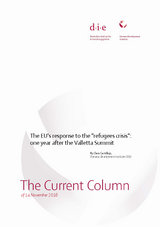The Current Column
The EU's response to the "refugees crisis": one year after the Valletta Summit
Castillejo, ClareThe Current Column (2016)
Bonn: German Development Institute / Deutsches Institut für Entwicklungspolitik (DIE) (The Current Column of 14 November 2016)
In November 2015 EU and African leaders met in Valletta, Malta, to agree on a response to a migration crisis that was creating intense political pressure on EU leaders. One year on, the EU Emergency Trust Fund for Africa (EUTF), which was established at Valletta, demonstrates some concerning trends in Europe’s response to migration and the future direction of its development policy. It also – potentially – offers an interesting opportunity to do things differently. The EUTF is based on the premise that irregular migration can be stemmed by development cooperation and assistance for African governments to manage migration. This logic runs through the EU’s current approach to migration, yet it is fundamentally flawed. Evidence does not suggest that lack of development causes migration. Indeed it shows that emigration increases with economic growth. Moreover, the idea that complex political, social and economic “root causes” of migration can be addressed through a short-term trust fund with a limited budget seems highly unrealistic. Indeed, many of those directly involved with the EUTF acknowledge that it cannot address “root causes”, as is its stated objective. Instead it is seen as a political gesture to leverage African cooperation on migration. This emphasis on buying African cooperation is increasingly central within the EU’s migration response. It is evidenced by the recent launch of ‘migration compacts’, which will channel aid through the EUTF conditioned on cooperation on migration management. Yet, even this more limited and transactional ambition for the EUTF seems questionable given the relatively small amounts of money on offer (the EUTF has 1,982 billion Euros to which 500 million has been added to implement the migration compacts) and the complex political, economic and security factors that shape African migration policies. The EUTF highlights some concerning trends in EU development policy. The fact that most the EUTF’s finance comes from the European Development Fund and other development instruments has raised concerns that it is diverting aid to promote EU migration and security interests in ways that stretch the definition of official development assistance. Certainly, the EUTF seems far removed from aid effectiveness principles and the EU’s own development commitments. It has little emphasis on ownership, partnership or alignment; it allocates funds based on levels of migration rather than need; it is designed, managed and implemented by Europeans; and it is closely linked to EU interests and uses conditionalities to promote those interests. There is widespread agreement that these characteristics will form part of future EU development policy. This suggests that the EUTF represents a broader shift away from core development principles that is ultimately not in the interests of the EU or its partners. The EUTF’s implementation to date has revealed weaknesses in EU processes and tensions between member states. There has been a lack of consistent strategic direction and oversight, which is problematic given the EUTF’s political sensitivity and speed of implementation. Critically, the selection of projects and implementers has not always been based on the best fit for the trust fund’s goals or the local context, but frequently on member states’ lobbying for funding for their implementing agencies. Lack of local consultation, critical discussion or oversight has also dogged project selection processes. There appear to be significant differences among member states and EU actors over the implementation of the fund, the projects it should support and the processes it should follow. Although the EUTF reflects broader weaknesses, this does not mean that it has nothing to offer. The EUTF has potential to add value in terms of flexibility and innovation, offering an opportunity to experiment with different ways of working, away from the restrictions of traditional development instruments. However, this requires a stronger emphasis on analysis, and learning and feedback. It also requires the Commission and member states to actively seek out and develop projects that can offer interesting lessons regarding working on migration related issues and with mobile populations. For example, projects that use a mobility and vulnerability lens to identify problems, target populations and shape responses; or projects that work on cross border issues such as trafficking, or assistance for stranded migrant populations. If the EUTF can be used to develop evidence on how to effectively address migration through a development lens, this could help to inform a more development oriented EU migration policy. It could also inform the reform of EU development instruments and programming to better equip them to deal with complex and rapidly shifting migration challenges.

